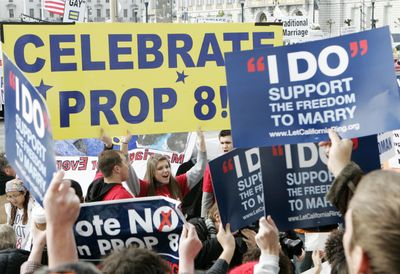California’s Proposition 8 likely to stand
State’s high court skeptical of claim of unconstitutionality

SAN FRANCISCO – As dueling demonstrators chanted and carried banners outside, the California Supreme Court strongly indicated Thursday it would rule that Proposition 8 validly abolished the right for gays to marry but allow same-sex couples who wed before the November election to remain legally married.
The long-awaited hearing was a disappointment for gay rights lawyers, who had hoped the same court majority that overturned the state’s previous marriage ban would conclude that Prop. 8 was an impermissible constitutional revision.
Two members of that majority – Chief Justice Ronald George and Justice Joyce Kennard – expressed deep skepticism of the gay rights lawyers’ arguments. Without their votes, Prop. 8 appeared almost certain to survive.
The other two justices who ruled in favor of marriage rights last year – Justice Carlos Moreno and Kathryn Mickle Werdegar – seemed more open to the revision challenge.
But the court revealed no division on whether to uphold the marriages of an estimated 18,000 same-sex couples who wed before November.
Even Justice Marvin Baxter, the court’s most conservative member, observed that the couples married after receiving the right by “the highest court of the state.”
“How can we deny the validity of those marriages?” Baxter asked.
The court’s ruling is due within 90 days.
Gay marriage advocates all but conceded defeat.
Kate Kendell, executive director of the National Center for Lesbian Rights, which represented some of the plaintiffs, acknowledged that the court had appeared skeptical of their arguments.
“I think conversations about going back to the ballot need to happen vigorously and strategically,” Kendell said.
The Proposition 8 campaign followed the California Supreme Court’s landmark 4-3 ruling on May 15 to overturn a ban on same-sex marriage. Gay couples quickly lined up to marry, many of them from out of state. The wedding business was brisk until Nov. 4, when Prop. 8 passed with 52 percent of the vote.
The legal challenges to the measure have been closely watched around the nation. Both opponents and supporters of gay marriage flocked to the state building here Thursday where the California Supreme Court is housed, each trying to drown out the other side with chants.
Gay rights lawyers had argued that Prop. 8 removed a fundamental right from a protected minority that has suffered discrimination.
As such, it revised the constitution, instead of merely amending it, they said. Revisions can be placed on the ballot only by a two-thirds vote of the Legislature or a constitutional convention.
Kennard, traditionally a strong supporter of gay rights, repeatedly noted that Prop. 8 was a mere 14 words and simply took away the “label” of marriage.
She reminded lawyers that the “core” part of last year’s marriage ruling required the state to give sexual orientation the same constitutional protection as race and gender.
Prop. 8 “hasn’t destroyed equal protection,” Kennard said. “I think what you are overlooking is the very broad powers of the people to amend the constitution.”
She described the Prop. 8 case as “completely different” from last year’s marriage cases.
“What I am picking up from this case is that the court should willy-nilly disregard the will of the people,” Kennard said.
George also indicated that the elevated constitutional status of sexual orientation was more important than the “mere designation” of marriage.
He noted that the California constitution has been amended more than 500 times and asked whether the real problem was that “it’s just too easy to amend the California Constitution.”
“Maybe the solution has to be a political one,” George said, and until the amendment process is changed, “isn’t this the system we have to live with?”